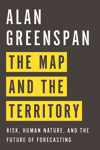No contrition from the Fed’s Mr Magoo
Book review: The Map and the Territory by Alan Greenspan The former Federal Reserve chief has come in for much heavy criticism over his new book. Matthew Partridge reports.

Get the latest financial news, insights and expert analysis from our award-winning MoneyWeek team, to help you understand what really matters when it comes to your finances.
You are now subscribed
Your newsletter sign-up was successful
Want to add more newsletters?

Twice daily
MoneyWeek
Get the latest financial news, insights and expert analysis from our award-winning MoneyWeek team, to help you understand what really matters when it comes to your finances.

Four times a week
Look After My Bills
Sign up to our free money-saving newsletter, filled with the latest news and expert advice to help you find the best tips and deals for managing your bills. Start saving today!

Published by Allen Lane
)
MoneyWeek
Subscribe to MoneyWeek today and get your first six magazine issues absolutely FREE

Sign up to Money Morning
Don't miss the latest investment and personal finances news, market analysis, plus money-saving tips with our free twice-daily newsletter
Don't miss the latest investment and personal finances news, market analysis, plus money-saving tips with our free twice-daily newsletter
Over the last five years, Alan Greenspan's reputation has collapsed. As head of the US Federal Reserve from 1987 to 2006, his easy-money policies were praised for boosting growth in the 1990s.
In 2000, presidential candidate John McCain even said that if Greenspan died, he would "prop him up and put sunglasses on him", so enamoured were investors of the Fed boss.
But those same policies are now widely blamed for the housing bubble and subsequent crash, and Greenspan has lost the maestro' nickname acquired in the boom years.
However, says Steven Pearlstein in The Washington Post, those "looking for [Greenspan] to accept any responsibility for the crisis" in his new book The Map and the Territory: Risk, Human Nature, and the Future of Forecasting will be "sorely disappointed".Instead of learning from his mistakes, "Greenspan seems determined to repeat them".
This book is meant to be "an account of his intellectual journey", but it ends up right back where he began, with his "antipathy toward market regulation" intact. Worse still, the book is poorly written, stuffed with "rambling and disjointed observations", "straw men" and "non sequiturs".
Greenspan should certainly have "been more specific in his recommendations", says former US Treasury Secretary Larry Summers in the Financial Times. Despite an apparent embrace of behavioural economics, he "sidesteps" the issue of whether the Fed should have been more involved in consumer protection.But the book is still "a very important statement, whether one ultimately agrees or disagrees with the author".
Greenspan has "a rare talent for framing economic trends", says Binyamin Applebaum in The New York Times. And his suggestion that America's woes are down to over-taxing the wealthy is "provocative".
However, he could have enlivened the book with more detail on his time as Fed boss. And while he blames the crisis on banks holding too little capital, he skips his role"in creating rules that let banks set their own capital levels".
The book says "next to nothing about the author's historic failure to reduce the risks leading to the crisis", says Bloomberg's Daniel Akst. And it only "pretends to tackle the subject of forecasting". Greenspan instead displays huge "chutzpa".
He attacks the bank bail-outs, even though as Fed chief he rushed "to float sinking markets with lower interest rates whenever they faltered". And he still thinks "the real problem is too much government". His "clueless" book is like an "art history by Mr Magoo".
The Map and the Territory: Risk, Human Nature, and the Future of Forecasting, by Alan Greenspan is published by Allen Lane (£25).
Get the latest financial news, insights and expert analysis from our award-winning MoneyWeek team, to help you understand what really matters when it comes to your finances.

-
 How a ‘great view’ from your home can boost its value by 35%
How a ‘great view’ from your home can boost its value by 35%A house that comes with a picturesque backdrop could add tens of thousands of pounds to its asking price – but how does each region compare?
-
 What is a care fees annuity and how much does it cost?
What is a care fees annuity and how much does it cost?How we will be cared for in our later years – and how much we are willing to pay for it – are conversations best had as early as possible. One option to cover the cost is a care fees annuity. We look at the pros and cons.
